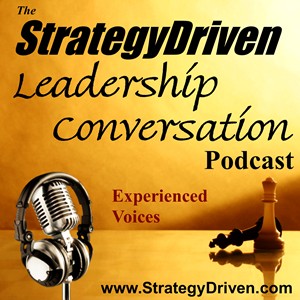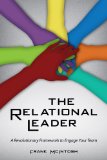Posts
StrategyDriven Leadership Conversation Episode 5a – Relational Leadership: The Building Blocks of Trust, part 1 of 2
/in Management & Leadership, StrategyDriven Leadership Conversation/by StrategyDriven
Episode 5a – Relational Leadership: The Building Blocks of Trust, part 1 of 2 explores how to establish and maintain trust between an organization’s executives, managers, and employees – the foundation without which no organization can be truly successful.
Additional Information
Complimenting the outstanding insights Frank shares in this edition of the StrategyDriven Leadership Conversation podcast are those he shared in a three-part series on Employee Retention:
- Relational Leadership and Employee Retention – A Match, part 1
- Relational Leadership and Employee Retention – A Match, part 2 (Segment One)
- Relational Leadership and Employee Retention – A Match, part 2 (Segment Two)
- Relational Leadership and Employee Retention – A Match, part 3
Final Request…
The strength in our community grows with the additional insights brought by our expanding member base. Please consider rating us and sharing your perspectives regarding the StrategyDriven Leadership Conversation podcast on iTunes by clicking here. Sharing your thoughts improves our ranking and helps us attract new listeners which, in turn, helps us grow our community.
Thank you again for listening to the StrategyDriven Leadership Conversation!
About the Author

(Course Technology PTR, Cengage Learning 2010). During his 36 year career, Frank has worked with many of the most recognized companies and executives in the world. He has provided consulting services for peers across the country and helped initiate Junior Achievement programs in Ireland, the Ivory Coast, Oman, the United Arab Emirates, Bahrain, and Uzbekistan. Frank was inducted into the Delaware Business Leaders Hall of Fame in October 2008, one of 38 individuals so honored and the first not-for-profit executive to receive this distinction in Delaware’s 300 year business history. To read Frank’s complete biography, click here.
For more information regarding this subject, visit Frank McIntosh at his website www.FJMcIntosh.com.
Podcast: Play in new window | Download (Duration: 22:30 — 31.0MB)
Subscribe: RSS
Decisions are Never Emotional
/in Decision-Making/by Sharon Drew Morgen
Decision-Makers Must Comply with Their System
Because decision-makers take actions that outsiders regularly believe to be ‘irrational’, we say that they are either ’stupid’ or making an ‘emotional’ decision. Neuroscientists call these decisions irrational or emotional as well. But we – the outsiders and neuroscientists – are rather biased: we see a problem, believe we know the solution, and consider our solution to be the best because it’s the most rational. We forget that every person, every group or family, every system if you will, has a very unique and idiosyncratic set of beliefs and criteria that determine their choices. And what may look irrational from the outside is very, very rational on the inside, even if sometimes unconscious.
Indeed, before anyone makes any decision, they consider it against their own beliefs. Would you walk over to a stranger in a park and harm him? No? Why not? That would be an emotional, irrational decision. But you wouldn’t do it because you have internal, unconscious beliefs and values that wouldn’t allow you to harm another person – especially a stranger.
No one makes decisions outside of their beliefs. The internal, private ’system’ that makes up our functioning rules (as individuals or groups) is sacrosanct, and if any decision might render the system useless, or ‘less-than,’ then another decision will be made. And outsiders cannot understand what’s going or become a part of that decision because, well, because they are outsiders.
If you were going to start working out daily, you’d have to either get up earlier or move something else in your schedule around. You’d have to probably start considering to eat healthier, and maybe stop having so many sugary drinks. It’s not about the gym, or about the weights; it’s about your system and how it’s willing to change so it all becomes a seamless whole that operates in tandem to serve you.
Decision-makers live in a unique system of rules and roles and relationships, history and initiatives, feelings and vendors and budgets. Change anything and everything else gets touched in some way. Before decision-makers decide, they must figure out how to manage all this so it ends up butter-side-up; understanding their needs, doing SPIN or Sandler or Relationship sales, or or or, only manages the problem end of the decision – the very, very last action that decision-makers need to take – AFTER they’ve managed their systems change bits. And again, no matter what we ask or what we are told, we can never, ever understand someone else’s system, just as they can’t understand ours.
About the Author

and the new book Dirty Little Secrets: Why buyers can’t buy and sellers can’t sell and what you can do about it
. She lives in Austin, Texas.
StrategyDriven Leadership Conversation Episode 4b – Relational Leadership: Attracting and Retaining Top Talent, part 2 of 2
/in Management & Leadership, StrategyDriven Leadership Conversation/by StrategyDriven
Episode 4b – Relational Leadership: Attracting and Retaining Top Talent, part 2 of 2 explores how to attract talented personnel and reduce the undesired attrition of top employees through development of a positive, reinforcing workplace environment where people feel they are valued and have the opportunity to grow.
Additional Information
Complimenting the outstanding insights Frank shares in this edition of the StrategyDriven Leadership Conversation podcast are those he shared in a three-part series on Employee Retention:
- Relational Leadership and Employee Retention – A Match, part 1
- Relational Leadership and Employee Retention – A Match, part 2 (Segment One)
- Relational Leadership and Employee Retention – A Match, part 2 (Segment Two)
- Relational Leadership and Employee Retention – A Match, part 3
Final Request…
The strength in our community grows with the additional insights brought by our expanding member base. Please consider rating us and sharing your perspectives regarding the StrategyDriven Leadership Conversation podcast on iTunes by clicking here. Sharing your thoughts improves our ranking and helps us attract new listeners which, in turn, helps us grow our community.
Thank you again for listening to the StrategyDriven Leadership Conversation!
About the Author

(Course Technology PTR, Cengage Learning 2010). During his 36 year career, Frank has worked with many of the most recognized companies and executives in the world. He has provided consulting services for peers across the country and helped initiate Junior Achievement programs in Ireland, the Ivory Coast, Oman, the United Arab Emirates, Bahrain, and Uzbekistan. Frank was inducted into the Delaware Business Leaders Hall of Fame in October 2008, one of 38 individuals so honored and the first not-for-profit executive to receive this distinction in Delaware’s 300 year business history. To read Frank’s complete biography, click here.
For more information regarding this subject, visit Frank McIntosh at his website www.FJMcIntosh.com.
Podcast: Play in new window | Download (Duration: 23:00 — 31.6MB)
Subscribe: RSS
Tactical Execution Best Practice 5 – No Co-, Only Vice
/in Premium, Tactical Execution/by StrategyDriven
Hi there! Gain access to this article with a FREE StrategyDriven Insights Library – Sample Subscription. It’s FREE Forever with No Credit Card Required.
| Sign-up now for your FREE StrategyDriven Insights Library – Sample Subscription
In addition to receiving access to Tactical Execution Best Practice 5 – No Co-, Only Vice, you’ll help advance your career and business programs through anytime, anywhere access to:
Best of all, it’s FREE Forever with No Credit Card Required. |
Additional Information
Added perspective on the merits of a singular leadership authority can be found in StrategyDriven Decision-Making Best Practice – There Can Be Only One.

 Assuming a leadership role makes one a public representative of the organization as well as bestowing decision-making authority over corporate resources; obligating the leader to act responsibly on behalf of the company 24 hours a day, 7 days a week, 365 days a year. This obligation cannot be taken lightly.
Assuming a leadership role makes one a public representative of the organization as well as bestowing decision-making authority over corporate resources; obligating the leader to act responsibly on behalf of the company 24 hours a day, 7 days a week, 365 days a year. This obligation cannot be taken lightly.